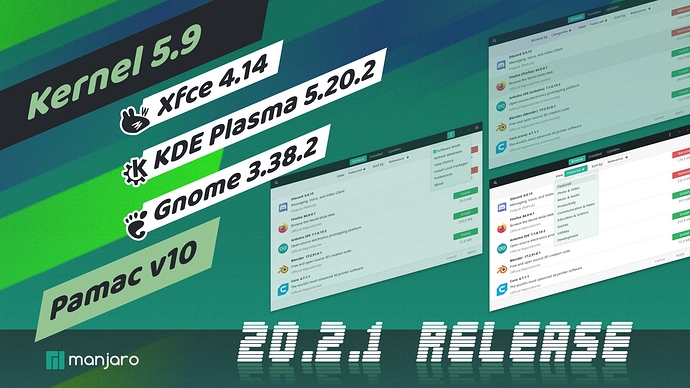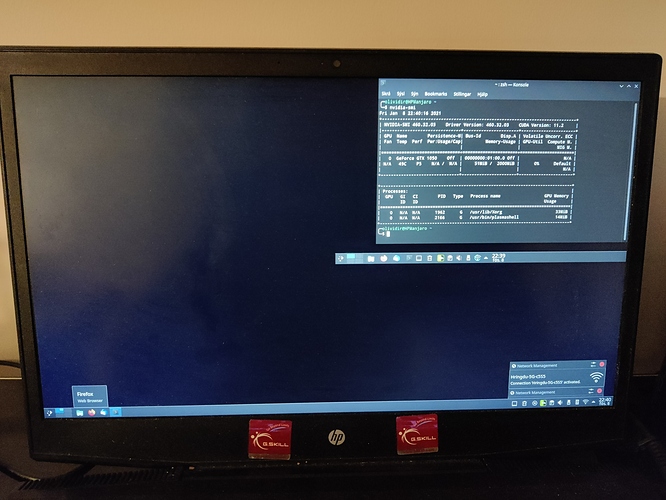Let’s clean this up a bit.
I updated through terminal, updates seemed to go fine, didn’t see anything strange (but didn’t have a firm eye on it). After update, the laptop did not want to reboot by going through the launcher, so I fired up a terminal and did sudo reboot (to get the changes).
After reboot, desktop looked fine, no problems, snappy.
Then I changed to Nvidia by using optimus-manager-qt (little icon in bottom panel). The log out was much faster than usual, but login was very slow. After putting in my password, the splash screen had a spinning circle underneath the plasma icon. After some time the circle stopped and the cursor came up, but computer was still on slpash screen. I gave this state few minutes but nothing happened (I could move the cursor).
I did TTY3 put in my username, and as I hit enter after putting in password, I was pulled back to TTY1 to the desktop seen below (I opened terminal though).
The bottom panel works, but right clicking on the black area results in nothing. Opening and closing a browser takes care of the “other” panel, but desktop still unresponsive.
I am able to TTY3 and startx. That gets me into a working environment with wallpaper, but no icon for optimus-manager-qt.
I am currently trying out the the broken tty1 to see if I can do any work. So far programs start and “work”, but are very sluggish.
I wonder what you would like to check, but to begin with, here is inxi -Fazzy
System:
Kernel: 5.10.5-1-MANJARO x86_64 bits: 64 compiler: gcc v: 10.2.0
parameters: BOOT_IMAGE=/boot/vmlinuz-5.10-x86_64
root=UUID=c815eb99-c4fe-44e6-9745-a703a1f11a87 rw quiet apparmor=1
security=apparmor udev.log_priority=3
Desktop: KDE Plasma 5.20.5 tk: Qt 5.15.2 wm: kwin_x11 dm: SDDM
Distro: Manjaro Linux
Machine:
Type: Laptop System: HP product: HP Pavilion Gaming Laptop 15-cx0xxx
v: Type1ProductConfigId serial: <filter> Chassis: type: 10 serial: <filter>
Mobo: HP model: 8478 v: 70.57 serial: <filter> UEFI: Insyde v: F.22
date: 04/21/2020
Battery:
ID-1: BAT1 charge: 24.6 Wh condition: 24.6/52.8 Wh (47%) volts: 12.8/11.6
model: Hewlett-Packard PABAS0241231 type: Li-ion serial: <filter>
status: Full
CPU:
Info: Quad Core model: Intel Core i5-8300H bits: 64 type: MT MCP
arch: Kaby Lake note: check family: 6 model-id: 9E (158) stepping: A (10)
microcode: DE L2 cache: 8 MiB
flags: avx avx2 lm nx pae sse sse2 sse3 sse4_1 sse4_2 ssse3 vmx
bogomips: 36812
Speed: 3722 MHz min/max: 800/4000 MHz Core speeds (MHz): 1: 3722 2: 3738
3: 3756 4: 3747 5: 3759 6: 3734 7: 3755 8: 3742
Vulnerabilities: Type: itlb_multihit status: KVM: VMX disabled
Type: l1tf
mitigation: PTE Inversion; VMX: conditional cache flushes, SMT vulnerable
Type: mds mitigation: Clear CPU buffers; SMT vulnerable
Type: meltdown mitigation: PTI
Type: spec_store_bypass
mitigation: Speculative Store Bypass disabled via prctl and seccomp
Type: spectre_v1
mitigation: usercopy/swapgs barriers and __user pointer sanitization
Type: spectre_v2 mitigation: Full generic retpoline, IBPB: conditional,
IBRS_FW, STIBP: conditional, RSB filling
Type: srbds mitigation: Microcode
Type: tsx_async_abort status: Not affected
Graphics:
Device-1: Intel UHD Graphics 630 vendor: Hewlett-Packard driver: i915
v: kernel bus ID: 00:02.0 chip ID: 8086:3e9b
Device-2: NVIDIA GP107M [GeForce GTX 1050 Mobile] vendor: Hewlett-Packard
driver: nvidia v: 460.32.03 alternate: nouveau,nvidia_drm bus ID: 01:00.0
chip ID: 10de:1c8d
Device-3: Cheng Uei Precision Industry (Foxlink) HP Wide Vision HD
Integrated Webcam
type: USB driver: uvcvideo bus ID: 1-5:5 chip ID: 05c8:03bc
Display: x11 server: X.Org 1.20.10 compositor: kwin_x11
driver: modesetting,nvidia display ID: :0 screens: 1
Screen-1: 0 s-res: 1920x1080 s-dpi: 96 s-size: 508x285mm (20.0x11.2")
s-diag: 582mm (22.9")
Monitor-1: eDP-1-1 res: 1920x1080 hz: 60 dpi: 142
size: 344x193mm (13.5x7.6") diag: 394mm (15.5")
OpenGL: renderer: GeForce GTX 1050/PCIe/SSE2 v: 4.6.0 NVIDIA 460.32.03
direct render: Yes
Audio:
Device-1: Intel Cannon Lake PCH cAVS vendor: Hewlett-Packard
driver: snd_hda_intel v: kernel alternate: snd_soc_skl,snd_sof_pci
bus ID: 00:1f.3 chip ID: 8086:a348
Sound Server: ALSA v: k5.10.5-1-MANJARO
Network:
Device-1: Realtek RTL8822BE 802.11a/b/g/n/ac WiFi adapter
vendor: Hewlett-Packard driver: rtw_8822be v: N/A modules: rtw88_8822be
port: 4000 bus ID: 02:00.0 chip ID: 10ec:b822
IF: wlo1 state: up mac: <filter>
Device-2: Realtek RTL8111/8168/8411 PCI Express Gigabit Ethernet
vendor: Hewlett-Packard driver: r8169 v: kernel port: 3000 bus ID: 05:00.0
chip ID: 10ec:8168
IF: eno1 state: down mac: <filter>
Drives:
Local Storage: total: 1.6 TiB used: 660.63 GiB (40.4%)
SMART Message: Unable to run smartctl. Root privileges required.
ID-1: /dev/nvme0n1 maj-min: 259:0 vendor: Samsung model: MZVLW256HEHP-000H1
size: 238.47 GiB block size: physical: 512 B logical: 512 B speed: 31.6 Gb/s
lanes: 4 serial: <filter> rev: CXB73H1Q temp: 42.9 C
ID-2: /dev/sda maj-min: 8:0 type: USB vendor: Toshiba
model: External USB 3.0 size: 931.51 GiB block size: physical: 512 B
logical: 512 B serial: <filter> rev: 5438
ID-3: /dev/sdb maj-min: 8:16 type: USB vendor: Western Digital
model: WD My Passport 0740 size: 465.73 GiB block size: physical: 512 B
logical: 512 B serial: <filter> rev: 1007
Partition:
ID-1: / raw size: 238.17 GiB size: 233.43 GiB (98.01%)
used: 57.63 GiB (24.7%) fs: ext4 dev: /dev/nvme0n1p2 maj-min: 259:2
ID-2: /boot/efi raw size: 300 MiB size: 299.4 MiB (99.80%)
used: 312 KiB (0.1%) fs: vfat dev: /dev/nvme0n1p1 maj-min: 259:1
Swap:
Alert: No Swap data was found.
Sensors:
System Temperatures: cpu: 58.0 C mobo: 29.8 C gpu: nvidia temp: 55 C
Fan Speeds (RPM): N/A
Info:
Processes: 314 Uptime: 11m wakeups: 1 Memory: 15.53 GiB
used: 5.5 GiB (35.4%) Init: systemd v: 247 Compilers: gcc: 10.2.0
clang: 11.0.0 Packages: pacman: 1399 lib: 423 flatpak: 0 Shell: Zsh v: 5.8
running in: konsole inxi: 3.2.01

